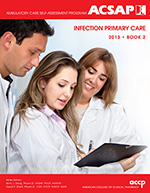
The prevention and management of infectious disease is a common problem for the clinical pharmacist working in the ambulatory care setting. Infection Primary Care, the next book in ACCP’s new Ambulatory Care Self-Assessment Program (ACSAP), presents evidence-based updates on a wide range of these disorders.
Infection Primary Care, to be released July 15, has three learning modules with an available 22 continuing pharmacy education (CPE) credits. The Board of Pharmacy Specialties (BPS) has approved ACSAP for use in Board Certified Ambulatory Care Pharmacist (BCACP) recertification.
The focus of the first module is on the prevention and treatment of common disorders, with chapters on antimicrobial prophylaxis, bone and joint infections, and skin and skin structure infections. The second module focuses on more chronic disease states, with chapters on primary care of the patient with HIV infection, tuberculosis, and viral hepatitis, together with the management of fungal infections. Pharmacotherapy for some of the most common infections is detailed in the third module, which has chapters on urinary tract infections, sexually transmitted infections, community-acquired pneumonia, and C. difficile infection/gastroenteritis/travel medicine prophylaxis.
All ACSAP chapters are fully referenced, with online links to literature compilers such as PubMed. Hypertext links provide ready access to clinical practice guidelines, official recommendations, and patient assessment tools. New graphic features focus on pivotal studies, patient care scenarios, and take-home points that can be readily integrated into clinical practice.
Infection Primary Care is designed to assist pharmacists who want to:
- Classify a patient’s requirement for pharmacologic prophylaxis according to local epidemiology, type of surgery, and patient characteristics.
- Distinguish common microorganisms associated with a specific type of bone or joint infection, and design an individualized pharmacotherapeutic plan for with an emphasis on outpatient parenteral antimicrobial therapy.
- Given a patient’s clinical presentation and risk factors, distinguish between the different types of superficial skin and skin structure infections.
- Devise evidence-based pharmacotherapy for the patient with HIV infection and cardiovascular disease, newly identified diabetes mellitus, or osteoporosis.
- Design a plan to optimize drug therapy in different patient populations for the treatment of multidrug-resistant tuberculosis.
- Apply screening, assessment, and prevention measures to the overall management of individuals with hepatitis C virus infection.
- Evaluate published data investigating the efficacy of systemic and topical antifungal therapy in treating onychomycosis and dermatophyte infections, and apply it to ambulatory practice.
- Evaluate the role of the newest antifungal agents in patients with allergic bronchopulmonary aspergillosis.
- Develop empiric antimicrobial treatment regimens for acute uncomplicated and complicated urinary tract infections (both cystitis and pyelonephritis).
- Apply an understanding of common presentation to identify, assess, and recommend clinical management and/or follow-up for STIs commonly encountered in the United States.
- Distinguish the most common community-acquired pneumonia pathogens and the risk factors for drug resistance among these pathogens to design an appropriate antimicrobial treatment regimen
- Demonstrate an understanding of the epidemiology, risk factors, pathophysiology, and clinical presentation of C. difficile infection.
- Design a malaria chemoprophylaxis regimen for a potential traveler.
The content of Infection Primary Care was developed under the leadership of Faculty Panel Chair Ralph H. Raasch, Pharm.D., FCCP, BCPS. Series editors for this new home study program are Betty J. Dong, Pharm.D., FASHP, FCCP, AAHIVP; and David P. Elliott, Pharm.D., CGP, FCCP, FASCP, AGSF.
ACSAP 2013–2015 books are available singly or as a six-book series and in four format packages. Other books in the series are Pulmonary/Preventive Care, Endocrinology/Rheumatology, Cardiology Care, Neurologic and Psychiatric Care, and Women’s and Men’s Care. For specific release dates, available CPE credits, and program numbers for each book, or to place your online order, visit the ACCP Online Bookstore. Books are priced as follows; shipping and handling charges apply only to print books.
ACSAP 2013–2015
| SINGLE BOOKS |
|
Member Price |
Nonmember Price |
| Standard Release (Online Book) |
Printable PDFs |
$65 |
$90 |
| E-Media Package |
Online book PLUS:
Full text and SAQs for e-reader, phones, tablets |
$80 |
$115 |
| SIX-BOOK SERIES |
|
Member Price |
Nonmember Price |
| Standard Release (Online Book) |
|
$285 |
$385 |
| E-Media Package |
|
$345 |
$485 |